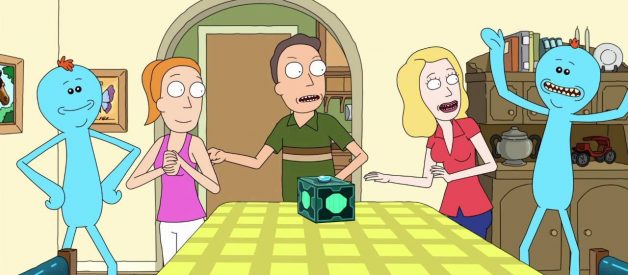This may seem like a strange time to write about the Rick and Morty character Mr. Meeseeks. Mr. Meeseeks debuted in the season one episode ?Meeseeks and Destroy,? when Rick?s Meeseeks Box brought the blue creature into being. It pains me to say that Mr. Meeseeks has appeared just once since that episode (and only in a brief cameo). In fact, it looks like he (they?) won?t show up in the long-awaited third season at all.
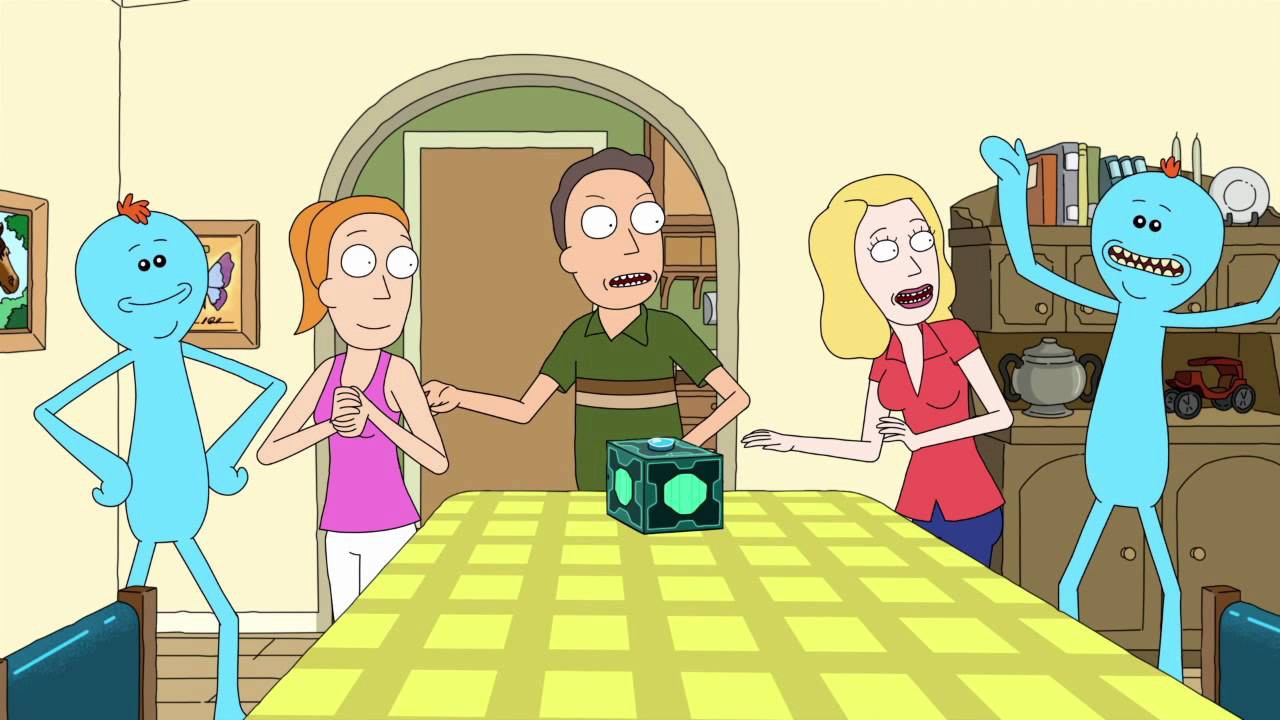 They can do many things, but they aren?t gods.
They can do many things, but they aren?t gods.
Mr. Meeseeks is (are?) defined by simplicity of purpose. When they complete the task for which they were created, they cease to exist. Appropriately enough, then, Mr. Meeseeks is designed to crave the nonexistence only achievable through such means. Thus, Mr. Meeseeks? cheerful, helpful demeanor is motivated by a death wish. The bruisability of the Meeseeks? robin?s egg blue veneer becomes apparent when fulfilling Jerry?s seemingly easy request to improve his golf game turns out to be virtually impossible. Things (and Meeseeks) quickly degenerate. As one desperate Meeseeks puts it, ?Existence is pain to a Meeseeks, Jerry! And we will do anything to alleviate that pain!?
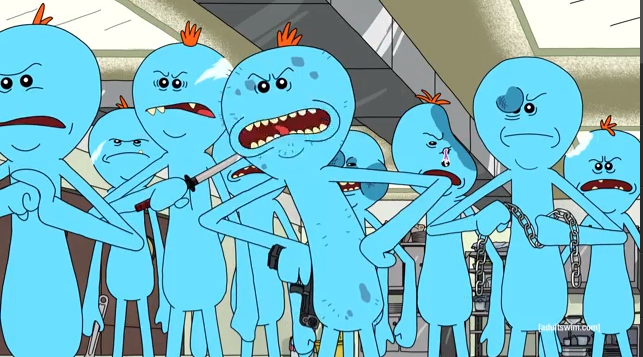
Though short-lived on Rick and Morty, Mr. Meeseeks has spawned a massive following of his own. He graces the profile picture of the ?We Believe in Nihilism? Facebook page, which is liked by more than 284,000 people. You can buy a Mr. Meeseeks costume from Walmart for Halloween, or you can buy Mr. Meeseeks salt and pepper shakers for any day of the year. And although Mr. Meeseeks did not single-handedly vault Rick and Morty to widespread popularity, it?s worth noting that ?Meeseeks and Destroy? was the highest-rated episode of the series up until that point. So, why did Mr. Meeseeks transcend the show that created and obligingly destroyed him?
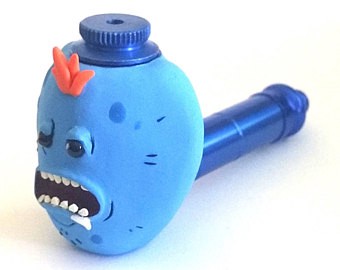 This is not Mr. Meeseeks.
This is not Mr. Meeseeks.
I think it has to do with our capacity to laugh at taboo or emotionally charged topics. Humor is, among other things, a mechanism for stress relief. Perversely enough, however, the most stressful topics are often the riskiest subjects for jokes. The popularity of ?We Believe in Nihilism? notwithstanding, it?s still difficult to joke about suicide. This is true despite shifting attitudes toward it in the United States. According to a 2016 Gallup poll, a majority of Americans condone physician-assisted suicide and would consider it for themselves. Further, not every example of conscious self-annihilation is considered morally equivalent. In virtually every society, including our own, suicidal acts for the greater good have been considered noble. The case of Todd Beamer, the United Airlines Flight 93 passenger who intentionally crashed that hijacked plane into a field in Pennsylvania so that it wouldn?t reach Washington, D.C., springs to mind. So do the hijackers themselves, at least when they?re considered within the context of their radical ideological milieu. But for the most part, and as memorably rendered in the season two Ricky and Morty episode ?Auto Erotic Assimilation,? suicide is rightly considered a preventable tragedy.
Suicide will be a part of the human condition for as long as we remain recognizably human. It is, for all intents and purposes, perennial. So while there will always be a reason to joke about suicide, it will also always resist comfortable assimilation in a humorous context. It will always be deeply serious, which means that jokes about it will forever remain necessary, dangerous, and either profoundly funny or profoundly unfunny.
As a subject for humor, suicide is strangely unlike 9/11, the sixteenth anniversary of which took place last week. Enough time has passed and enough memes have been made that humor focused on 9/11, particularly on 9/11 conspiracy theories, has become old hat. Indeed, 9/11 jokes may someday circle back to being unambiguously unfunny online, though not for the reasons they would have been considered unfunny on September 12th, 2001. Terrorism may be perennial, but 9/11, as tragic as it was, only took place once.
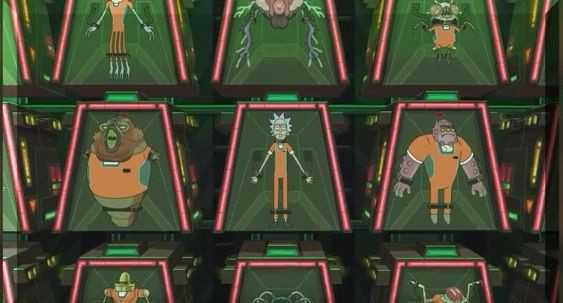 Intergalactic terrorist Rick Sanchez proves that it?s possible to joke about terrorism.
Intergalactic terrorist Rick Sanchez proves that it?s possible to joke about terrorism.
So, how do you joke about the permanently permanent solution to temporary problems? You can joke about mental illness within the humanizing framework of a prankish but ultimately supportive community, which is roughly what Ring Lardner, Jr. and Robert Altman did with the fake suicide of ?Painless Pole? Waldowski in the movie MASH. You can also edge closer to the void, which is what the writers of Rick and Morty did when they created Mr. Meeseeks. Mr. Meeseeks is a non-human creature with a hazy sense of individuality and the personality of Microsoft Word?s much-maligned Clippy, which makes it that much easier for an audience to accept his unremitting urge to die. While everyone looks at Mr. Meeseeks, everyone can also acknowledge their pain by laughing. Laughter may not be the best medicine, but it?s certainly better for you than whatever Rick is drinking, snorting, doing, or not doing.
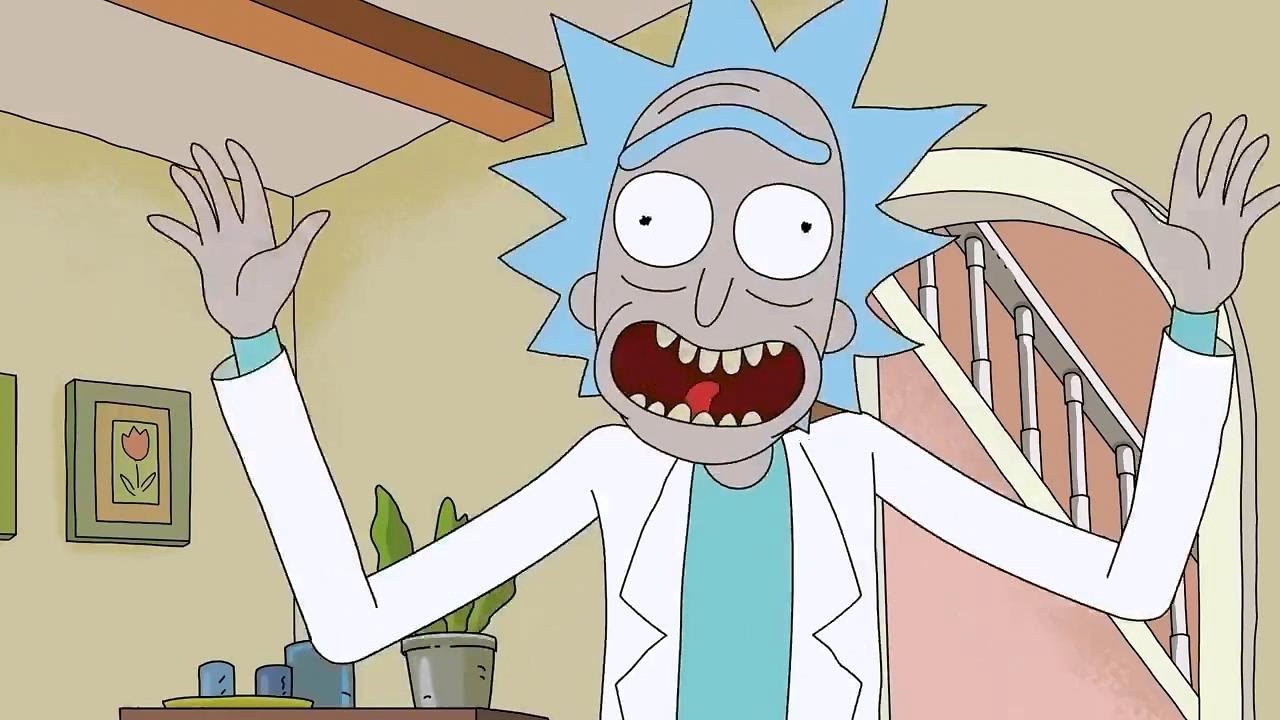 ?I am in great pain. Please help me.?
?I am in great pain. Please help me.?
